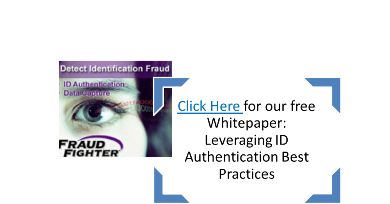 The world has changed much since September 11, 2001. Awareness of how fragile our way of life can be, what steps must be taken to protect it and what might happen if we don't, is now a constant part of our national psyche. It is probably safe to say that while the degree of American military involvement overseas may fluctuate with the times and conditions, the War on Terror at home likely will not. Although anti-terrorism efforts are focused on potential overt acts of violence by international terrorist groups, it is specter of domestic covert acts intended to generate funding for terrorism that is at the forefront of our national security efforts.
The world has changed much since September 11, 2001. Awareness of how fragile our way of life can be, what steps must be taken to protect it and what might happen if we don't, is now a constant part of our national psyche. It is probably safe to say that while the degree of American military involvement overseas may fluctuate with the times and conditions, the War on Terror at home likely will not. Although anti-terrorism efforts are focused on potential overt acts of violence by international terrorist groups, it is specter of domestic covert acts intended to generate funding for terrorism that is at the forefront of our national security efforts.
The Patriot Act expanded the concept of terrorism to include domestic terrorism. The Act states, in pertinent part:
(5) the term `domestic terrorism' means activities that--
`(A) involve acts dangerous to human life that are a violation of the criminal laws of the United States or of any State;
`(B) appear to be intended--
`(i) to intimidate or coerce a civilian population;
`(ii) to influence the policy of a government by intimidation or coercion; or
`(iii) to affect the conduct of a government by mass destruction, assassination, or kidnapping; and
`(C) occur primarily within the territorial jurisdiction of the United States.'.
Detecting activities intended to finance terrorism is extremely difficult. Financial institutions are not expected to distinguish terrorist financing from other criminal misuse of the financial system. They are, however, tasked with ascertaining whether any transactions are suspicious, either because they are unusual or, by their very nature, are indicative of potential criminal activity.
 Money laundering is at the heart of most illegal financial transactions and is made possible through the use of identity theft. Many measures have been enacted to require financial institutions and other businesses to detect and assist the U.S. government in preventing money laundering. These include, among others, the Bank Secrecy Act, regulations from the Office of Foreign Assets Control, the Know Your Customer Act, the Fair and Accurate Credit Transactions Act and the Red Flags Rule developed by the FTC.
Money laundering is at the heart of most illegal financial transactions and is made possible through the use of identity theft. Many measures have been enacted to require financial institutions and other businesses to detect and assist the U.S. government in preventing money laundering. These include, among others, the Bank Secrecy Act, regulations from the Office of Foreign Assets Control, the Know Your Customer Act, the Fair and Accurate Credit Transactions Act and the Red Flags Rule developed by the FTC.
Underlying these statutes, regulations and rules is the basic concept of identifying the person who attempts to conduct a financial transaction (e.g., a wire transfer, purchase of a money order, opening a new account, etc.) with the intention of ultimately funding terrorism or other criminal activity. Because identifying the person suspected of engaging in such activity is paramount to any criminal investigation, priority is placed on identity verification.
There are many identity verification tools available. The Fraud Fighter™ line of identity authentication equipment provides the degree of technological sophistication and effectiveness necessary to ensure compliance with the laws pertaining to the monitoring of financial transactions and identity verification.
Modeled on the same concepts used to secure IT networks from intrusion, Fraud Fighter™ will optimize organizations' regulatory compliance framework by helping structure an intelligently "layered" approach to the problem. "Layering", in this context, means targetting the appropriate level of technology at the appropriate level of threat. So, for those areas where risk exposure is minimal, lower end (and less expensive) equipment can be utilized, while higher risk activities are equipped with the higher-end, most technolgically advanced soutions.
At the top-end, technologically, lies the Fraud Fighter™ line of identity authentication and image capturing equipment. These machines are capable of capturing encrypted images of ID documents and performing high-confidence authentication of the validity of the document. An organization will be able to capture digital images of documents, validate and authenticate those documents and then store the captured data in encrypted files that meet or exceed all privacy and security standards.
Fraud Fighter™ ID Authentication: The ideal mechanism for identity verification, thereby fighting both fraud and the War on Terror.


